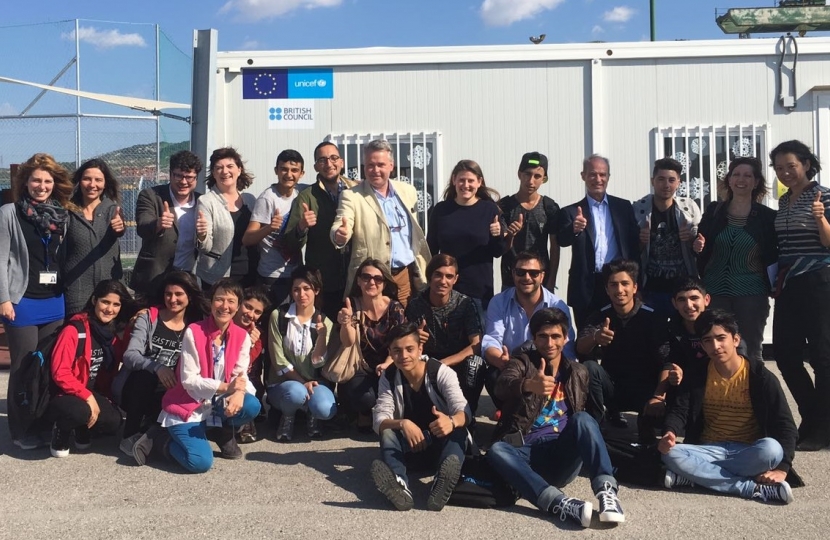
For a teenage boy arriving on a Greek island having risked his life at the hands of people smugglers and escaping shelling in Aleppo the finer points of Brexit are not high on the agenda. So last week we parked opposing views on Britain and the EU and focused instead on the crisis facing refugee children.
We took up an invitation from Unicef to travel to Athens to see for ourselves how refugee children, and especially unaccompanied asylum seeking children, are being looked after once they reach Greece.
The shocking images of lifeless infants washed up on Greek beaches that dominated our screens may have subsided but the problem has not gone away. The challenge of 2000 refugees a day at its height last year may have greatly reduced in Greece but other countries like Italy continue to bear the brunt of new arrivals.
There still remain 20,500 refugee and migrant children, spread across 53 official camps or on a waiting list even to access shelter. Over 2000 of these children are on their own and face a particularly uncertain future. The phlegmatism of these unaccompanied children and their desperation to develop their languages and other skills to fulfil their ambitions to be engineers, doctors or teachers in countries that would actually value them is humbling.
They are doubtful that Greece, suffering its own financial crisis, can offer many of them long-term stability or safety. They want to move on, to find family, security, education — to have the chance, like our children, to grow up and live their lives.
Inexcusably, it still takes over a year between arriving at a “processing centre” and standing any chance of getting a decision on relocation to another European country, and they are the lucky ones.
The UK has not been totally absent from this crisis. We were pleased to hear that UK aid money injected early was at the vanguard of setting up secure children’s shelters. UK funding has also supported excellent schemes such as schools for children in refugee camps, which we saw effectively delivered by Unicef and the British Council. But that money will soon come to an end, and, with it, the only significant material help we have given so far.
There have been no transfers at all from Greece to the UK under the Dubs scheme, despite the fact that everywhere we went people seemed to have heard all about Alf Dubs. Only nine children have been reunited with family members in Britain under what is known as the Dublin scheme.
The UK Home Office has offered 50 final Dubs places. The home affairs select committee was told that our local authorities could offer more places if central funding is made available. Fifty places in the face of 2000 unaccompanied migrant children seems very small.
It would be wrong to get hung up on just one refugee scheme, and Britain’s generosity to Syrians closer to their homes is to our credit, but local charities helped children prepare their applications for Dubs only to have to tell them that the original scheme had been scrapped before anything could come of it.
This was heart-breaking, not just for the children, but for the charities whose biggest challenge is getting children to trust the rule of law, and resist the lure of unscrupulous people smugglers.
The UK can do more to help, and we must. There are three obvious and immediate ways in which we can do so.
Firstly we know from our time in the Department for Education that the UK has a world-leading child protection system. Greece is stretched looking after its own children let alone the new arrivals. It lacks a comprehensive fostering and adoption system or the social workers to co-ordinate it. We could offer our expertise to Greece to help them keep children safe and away from smugglers and traffickers and provide settled homes with welcoming families.
Secondly, we can speed up the process for reuniting children with family in the UK. We have had only one Home Office employee currently working on this in Athens, and despite her backbreaking work, the enormous time-lag before a claim is avoidable and unacceptable. The UK Home Office could invest in having people on the ground in Greece and at home, to verify more urgently claims of family living in the UK that it would be in the best interest for the child to be with.
Finally, the rules of this vital system for family reunification can be improved. Soon a new system for European family reunion will come into place (Dublin 4) — one which the UK will not be part of. With the Dubs scheme gone, this will mean that there is no obvious legal or organised way left for refugees to get to the UK from Europe.
If we are to be a global Britain that really is outward-looking then we need to play a greater part in providing a safe place for young people to rebuild their lives. A swift, efficient UK system for refugee family reunion would ensure a long-term, sustainable way of preventing children making these hopeless, dangerous journeys in the first place and should be part of our new immigration policy.
Nicky Morgan is the former education secretary and Tim Loughton is the former minister for children and families.
This article originally appeared in the Times: https://www.thetimes.co.uk/article/to-truly-be-a-global-nation-we-must-help-desperate-refugee-children-mkxgx38jt
